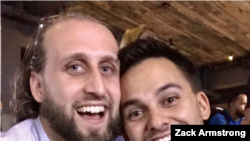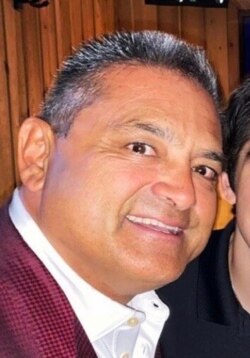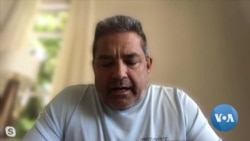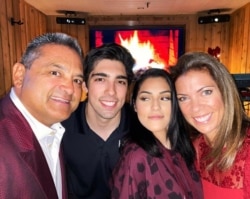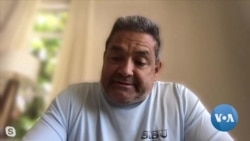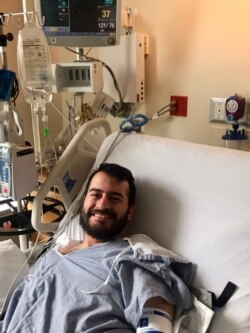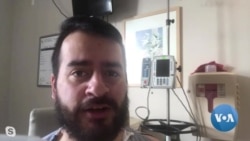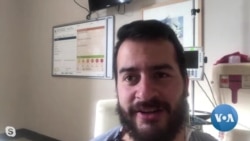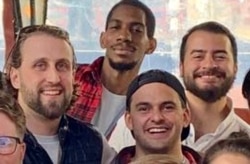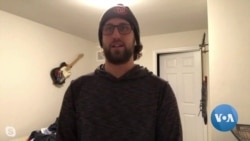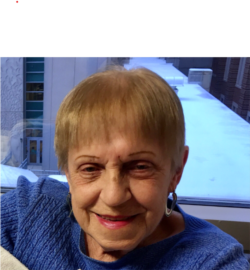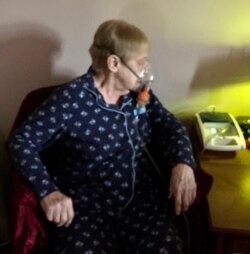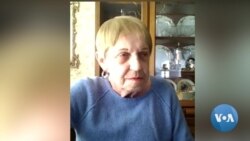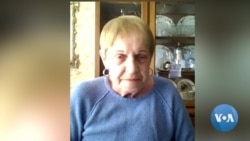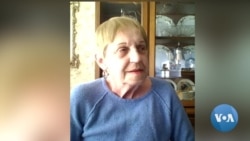Much has been written of the warning signs, symptoms and dangers of COVID-19. But what is it like to live through an active infection? Several sufferers share their stories, day-by-day medical conditions, thoughts and observations with VOA’s Carolyn Presutti in this third installment of a bi-weekly series chronicling life with the coronavirus. The first installment can be read here. The second installment can be read here.
Carlos Gavidia
53 years old
Jupiter, FL
Retired entrepreneur
No underlying health conditions
'We have the antibodies they need'
Carlos Gavidia wears two wedding rings. The smaller one keeps the larger one from sliding off his finger. He lost nearly 12 kg as the coronavirus ravaged his body for two weeks, at one point necessitating a harrowing ambulance trip to the hospital.
Now, having recovered from the worst of COVID-19, he wants to donate something precious to help the nation that took him in as an immigrant more than four decades ago.
“My son and my wife are flying to New York City going to Mount Sinai Hospital. And we're going to be donating our blood, trying to save other people. We have the antibodies that they need,” an excited and hopeful Gavidia told VOA earlier this week.
With America’s death toll from the pandemic climbing past 6,000, doctors want to extract antibody-rich plasma from the blood of recovered patients like Carlos to save lives in COVID-19 hotspots like New York.
But logistical complications and restrictions forced by the coronavirus are getting in the way.
Disappointment and disruption in plans
It was nearly midnight the night before a scheduled flight to New York when Gavidia had to write the president of New York’s Mount Sinai Hospital to tell him he and his family would not be coming.
Two private pilots backed out of the flight after learning they would have to quarantine for two weeks if they entered New York, the epicenter of COVID-19 infections in the United States.
Refusing to give up, Gavidia wrote Mount Sinai, asking if blood donated at a hospital near their home in Florida could to be transported to New York. He is still awaiting a response.
It would be the first time the Gavidia family has ventured outside their home together since they arrived home sick from a ski trip to Colorado. Gavidia spoke bravely but acknowledged his family would face unknown risks, given that so little is known about the immunity of patients who recover from this new disease.
“So it's a risk, you know, can we get re-infected? I don't know. There's I hear all kinds of stuff on the news about it, but it's a risk we are willing to take.”
Forced family time
Gavidia called his “forced family time” with the coronavirus a “blessing” in that it brought them all closer together. Once everyone was feeling better, he, his wife, son and daughter began passing the time playing board games and learning how to cook for themselves. Gavidia, a native of Peru who once sold hotdogs before rising to become the CEO of a financial services company, said the food he misses most is rice and beans from his favorite restaurant.
In our next installment, we find out if Gavidia’s blood reached New York.
Francis Wilson
27 years old
Arlington, VA
Full-time law clerk/part-time law student
No underlying health conditions
Zack Armstrong
29 years old
Arlington, VA
Technical recruiting manager
No underlying health conditions
'I’m a dream patient, coming through like this'
Francis Wilson’s first thoughts as he opened his eyes were, “I’m alive?” The 27-year-old had been on a ventilator and in a coma for 10 days.
Wilson has been moved from intensive care to a regular COVID-19 room at George Washington University Hospital in the nation’s capital. Medical personnel enter one at a time, their scrubs covered by disposable protective gear that Wilson listed as: “a facemask, hairnets and a visor kind of thing.”
“Little things” to appreciate
Except for cellphone video chats when he feels strong enough to speak, he’s had no contact with his family or friends. Speaking with VOA, he counted his blessings.
“I'm getting my appetite back, being able to eat and just shakiness in my extremities because of dehydration. And you know, definitely weaker because of a loss a lot of weight but that's probably a good thing,” he said.
“It's the little things that you really start taking for granted. The ability to breathe on your own without a tube coming out of your mouth or the ability to fall asleep. You know, sleeping however you want. It's the little things that you really don't appreciate until it's taken away from you,” he said.
Pho and Penelope
Wilson looks forward to leaving the hospital soon, ordering takeout from his favorite pho (Vietnamese soup) restaurant and re-uniting with his two roommates and pet hedgehog, Penelope.
The upbeat Wilson said his weakened body shakes uncontrollably, then joked that he’s probably already won a 7kg weight loss challenge with his roommates, who have been quarantined and battling their own COVID-19 symptoms.
“It's the little things that you really start taking for granted. The ability to breathe on your own without a tube coming out of your mouth or the ability to fall asleep. You know, sleeping however you want. It's the little things that you really don't appreciate until it's taken away from you,” he said.
Going beyond roommate duties
Wilson’s roommates have been preparing for his return, while still nursing themselves back to health. Zack Armstrong and Bruce Barlow donned protective gear and completed a deep cleaning of Wilson’s bedroom, which they had sealed off from the rest of the apartment in northern Virginia. Armstrong spoke with VOA from Francis’ room after the cleaning.
“So my roommate Bruce and I actually put on our ski goggles and our face masks and our hats and we came in Francis’ room,” he said. “We did his laundry for him. We washed the sheets. We vacuumed his carpet. We took Lysol wipes to all the surfaces and doorknobs and everything in here, his dresser and you know, his bed frame and just tried to clean it up as much as possible.”
Thursday was to be the roommates’ final day of quarantine, but Zack Armstrong said he will extend his isolation while he battles raging migraines.
In our next installment, we follow Wilson home to the apartment for his reunion with roommates he has not seen in more than two weeks.
Connie Lambert
76 years old
Chicago, IL
Restauranteur, retired
Prior health issues: Lung cancer, stroke
'I just sat there in awe, in disbelief'
Connie Lambert waited over two weeks to get a COVID-19 test result. Just getting tested had been a nightmare, as she’d had to wait seven hours to be swabbed at a Chicago-area hospital. The long wait to learn if she was infected and had possibly spread the virus to her loved ones was adding mental stress to her declining physical condition. Day by day, breathing got harder as pain and exhaustion worsened.
Lambert was convinced she had COVID-19. Then the phone rang. It was the doctor.
“I answered the phone, ‘Connie, the results are in.’ I kind of held my breath for a second,” she recalled. “‘You're negative.’ ‘Negative?’ I couldn’t believe it.”
Lambert said the negative result shocked her and she just “sat in awe and in disbelief.”
Then – what’s wrong with me?
While cheered by the news, Lambert remains perplexed. The cancer and stroke survivor has been ailing – something is wrong. She worries what will become of her if her health declines further and she has to be admitted to a hospital already overburdened with COVID-19 patients.
“Hospitals are full of people with the virus. Staff are so low. People aren’t being taken care of the way they should be. They don’t have protective gear. Where are they going to put me? Hospitals are out.”
Living for today
For now, Lambert tries to focus on the positive – she dodged the coronavirus bullet.
“I thank God so much. I have a reprieve,” she said. “I'm thinking, there's something in this world I haven't accomplished. Haven't done for someone. I have to make sure I take care of it.”




